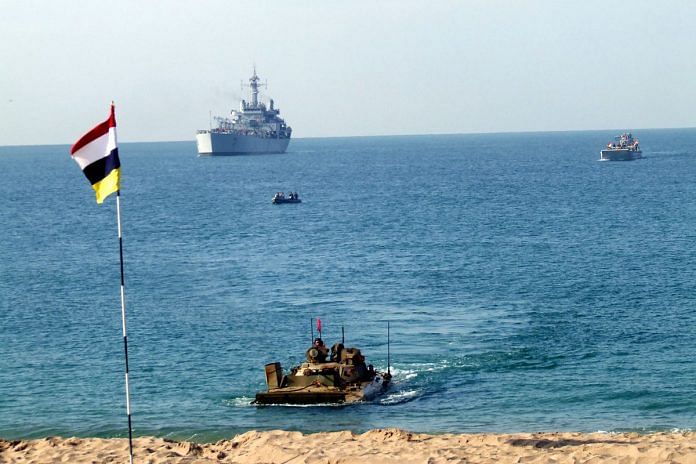Long range missiles, terrorism and information warfare put civilians at the centre of conflicts. Nations like India need to have a plan on how to deal with them.
In the past few months there has been more and more talk of India’s preparation for short, swift wars. A recent article said the government is giving “special financial powers to the Army to deal with critical deficiencies in ammunition and spares to wage a short and swift war.” On Air Force day, Air Chief Marshal B.S. Dhanoa said, “The nature of conflict in the present geopolitical environment may require us to fight a short and swift war”.
But in reality, the chances of a successful, short and swift war are minimal, even when facing a much weaker opponent. The side with greater economic power, more aircraft, battleships and tanks, does not often win. While the practice of predicting the future can be risky, the trends, in this case, have been clear for some time.
Here are two recent examples to consider. On 20 March 2003, U.S.-led forces invaded Iraq, and 20 days later the Iraqi Army had been routed and Baghdad captured. However, this was only the beginning of a longer American war in Iraq, which lasted till their troops pulled out of the country in December 2011. It is almost a similar story in Afghanistan with the U.S. military presence in the country now entering its 17th year.
Perhaps the most famous short war is the Six-Day 1967 Arab-Israeli war. In a lightning quick campaign, Israel destroyed the Arab forces and seized control of the West Bank and East Jerusalem from Jordan, the Gaza Strip and the Sinai Peninsula from Egypt, and the Golan Heights from Syria. Although the war was decisively won, conflict in the captured territories of West Bank and Gaza Strip continues to plague Israel after 50 years.
War-fighting strategies have been the exclusive domain of military leaders, while the political leadership dictates the national aim for which military power is used. It is therefore incumbent on the military leadership to constantly evaluate the likely nature of future conflicts.
Short and swift wars may not necessarily translate into victory. Future wars will be long and the political consequences heavy. Winning the peace is more important than winning the war. This requires the military to develop a different set of capabilities.
The civilian population, particularly in India, has largely remained isolated from the wars that the nation has fought. This may now change as the nature of conflicts changes.
Over a decade ago, British Army Gen Rupert Smith wrote that the new paradigm of war would be ‘war amongst the people’. Long range missiles have eradicated frontlines, and people are no longer isolated from the battlefield. The people in Delhi are as much a target as the soldiers in their trenches. It is the possession of ballistic missiles that enables North Korea to challenge the strongest nation in the world.
Terrorism does not distinguish between combatants and civilians. Terrorists have struck not only in Syria and Afghanistan, but the most peaceful cities of London, Paris and Brussels. In France, 161 civilians died in 2015 in terrorist incidents. In comparison, 88 French military personnel were killed in Afghanistan between 2001 and 2015.
Battles will be won not only in the minds of opposing commanders, but in a contest for the will of the people. As leaders increasingly evoke nationalism, popular perceptions will play a key role.
On 3 Oct 1993, an American Special Operations team was sent into Mogadishu to arrest two lieutenants of Mohammed Aidid, a warlord who controlled the city. The raid, estimated to last about 30 minutes, continued for 15 hours.
Thousands of Somalis were killed while the U.S. lost 18 soldiers. The casualties were not heavy, but as TV footage of dead Army Rangers being dragged through the streets of Mogadishu was aired, the American people were horrified. Public pressure so weakened the US political resolve that they pulled out of Somalia in six months.
Information warfare is real, and it is much more potent than cyber attacks. Data is not only the new oil, but also a potential weapon. As the cost of saving data plummets, more and more information is being stored about individuals. These huge databases, when combined with the growing power of Artificial Intelligence, wield enormous power.
Even today, individually targeted advertisements are being used commercially to influence our buying choices. Tomorrow, can this medium be also used to inflame passions, lower morale and force a change in strategic decisions? If this appears far-fetched, look at the examples of firms like Aggregate IQ and Cambridge Analytica, which have been credited with using AI-targeted advertisements on social media to help swing the Brexit referendum and the US presidential elections. It is unclear as to who in India is responsible for offensive and defensive operations in this area.
Guns, fighters and ships are essential components of military power, but capabilities to be developed must also take into consideration the new kinds of conflicts and attacks that we could face. This requires a serious debate, not only among the military, but a larger civil community, which no longer has the luxury of remaining unscathed.




General while in service you all should have pushed hard to ensure the Army is well equipped and stocked to fight wars and long drawn out conflicts. Sadly thats not been the case, no one in the Army Brass wants to rattle the system. Muteness at the cost of National Security. Naam Namak Nishan – is what you all have to fight for.